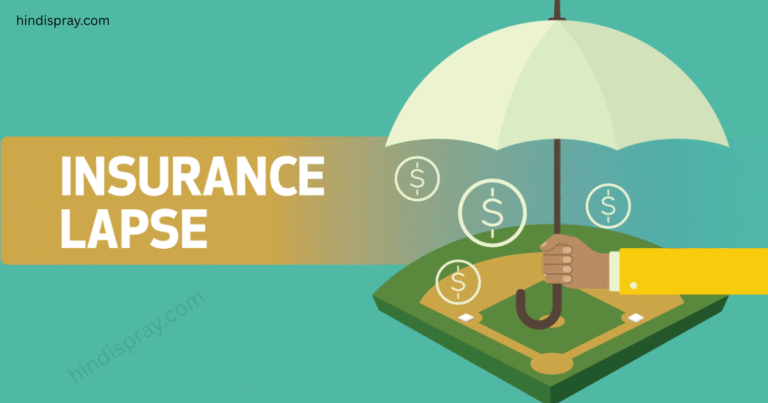In the world of financial planning, insurance serves as a critical safety net against life’s uncertainties—be it health crises, vehicle damage, or the death of a loved one. However, one concept often overlooked yet profoundly impactful is an insurance lapse. An insurance lapse may seem like a minor administrative oversight, but its consequences can be financially devastating.
This article explores what an insurance lapse is, why it occurs, the risks associated with it, and how to avoid it to maintain continuous protection for yourself and your loved ones.
What Is an Insurance Lapse?
Definition
An insurance lapse occurs when a policyholder fails to pay their insurance premium by the due date, and after any applicable grace period, the policy is terminated or becomes inactive. This means the individual is no longer covered and is at risk of having to bear losses out of pocket during this uninsured period.
Common Types of Insurance Lapse
- Auto Insurance Lapse: Driving without coverage can lead to legal penalties.
- Health Insurance Lapse: Could result in massive out-of-pocket expenses for medical emergencies.
- Life Insurance Lapse: Your beneficiaries will no longer receive the death benefit.
- Homeowners/Renters Insurance Lapse: Property damage during this time won’t be covered.
- Business Insurance Lapse: Can jeopardize business continuity and legal compliance.
Why Insurance Lapses Occur
Understanding why insurance policies lapse is essential to preventing them. Some common causes include:
1. Missed Premium Payments
The most common reason is the failure to pay premiums on time. This can happen due to financial hardship, oversight, or lack of automated payment systems.
2. Inadequate Communication
If the insurer’s communication doesn’t reach the policyholder (wrong address/email), they may miss critical reminders or notices about upcoming payments.
3. Policy Misunderstanding

Many policyholders misunderstand grace periods, reinstatement clauses, or the consequences of non-payment. They might assume they have more time or that the insurer will automatically extend coverage.
4. Changing Banks or Payment Methods
Switching bank accounts or cards without updating the insurer often leads to failed transactions, causing unintended lapses.
Consequences of an Insurance Lapse
The repercussions of a lapsed policy can be both immediate and long-term. Here’s why you should take it seriously:
1. Loss of Coverage
When your policy lapses, you are no longer protected. If an accident, illness, or emergency occurs during this period, you bear the full cost.
2. Legal Penalties
For types like auto insurance, driving without coverage is illegal in most jurisdictions and can result in:
- Hefty fines
- Suspension of your license or registration
- Possible jail time
3. Higher Future Premiums
Insurers view lapses as risky behavior. When you reapply, they may classify you as a high-risk customer and raise your premium.
4. Loss of Policy Benefits
In life insurance, a lapse can result in:
- Loss of accumulated cash value (in case of whole life or ULIP plans)
- No death benefit payout
- Ineligibility for future reinstatement
5. Difficulty Getting Reinsured
A history of lapsed policies can hurt your reputation with insurers, making it harder to obtain coverage in the future.
Grace Period and Reinstatement: A Second Chance
What Is a Grace Period?
Most insurance policies come with a grace period, typically ranging from 15 to 30 days, where you can make the payment after the due date without losing coverage.
Important Note: During this grace period, the policy is still active, but late fees may apply.
How to Reinstate a Lapsed Policy
Reinstatement allows you to reactivate your policy, but often comes with conditions:
- Payment of all due premiums
- Late fees or penalties
- Medical examinations (for health/life insurance)
- Underwriting approval
Tip: The sooner you act after a lapse, the higher your chances of successful reinstatement.
How to Avoid an Insurance Lapse
Prevention is always better than cure, especially when it comes to insurance lapses. Here are some proactive steps:
1. Set Up Auto-Pay
Automatic deductions ensure you never forget a premium due date.
2. Opt for Annual Payments
Paying your premium annually (if financially feasible) reduces the chances of a lapse due to missed monthly payments.
3. Keep Contact Information Updated
Ensure your insurer has your current email, phone number, and address for timely reminders.
4. Monitor Your Bank Accounts
Make sure there are sufficient funds in your account, especially around premium due dates.
5. Maintain an Emergency Fund
Having a buffer for premium payments during tough times can help you avoid missing payments.
6. Use Reminders and Alerts
Set reminders in your calendar or mobile device for due dates, especially for multiple policies.
7. Communicate with Your Insurer
If you’re facing financial difficulties, inform your insurer. They may offer alternate payment schedules, extensions, or other solutions.
Real-Life Examples of Insurance Lapse Consequences
Case Study 1: Auto Insurance
John, a 28-year-old driver in Texas, forgot to pay his auto insurance premium after moving to a new city. His coverage lapsed for just 10 days. Unfortunately, he had a minor accident during that period. Result: $7,000 in repair costs out of pocket and legal fines for driving uninsured.
Case Study 2: Life Insurance

Priya, a 45-year-old homemaker in Mumbai, let her term life insurance policy lapse after missing two monthly premiums. She passed away unexpectedly a few months later. The insurance company declined the death benefit claim, leaving her family financially vulnerable.
Long-Term Impact of Frequent Insurance Lapses
Frequent lapses not only cost you money but can also:
- Damage your credit score (if referred to collections)
- Cause loss of loyalty discounts
- Lead to rejection for future policies
- Raise red flags during background checks for loans or business licensing
Also Read: Understanding Insurance Coverage Limits: What You Need To Know
Conclusion
An insurance lapse might appear to be a small slip-up, but its consequences can echo far into the future. Whether it’s health, auto, life, or any other type of insurance, maintaining continuous coverage is essential for financial security and peace of mind. Simple strategies like setting up auto-payments, staying informed, and communicating with your insurer can go a long way in preventing a lapse. Don’t wait until it’s too late—review your policies today and take control of your coverage.
FAQs
1. What happens if my insurance policy lapses?
You lose coverage immediately after the grace period ends. Any claims made during the lapsed period will likely be denied, and you may face legal or financial consequences depending on the type of insurance.
2. Can a lapsed insurance policy be reinstated?
Yes, most insurers allow reinstatement within a certain period, provided you meet specific conditions like paying overdue premiums, interest, and sometimes undergoing medical tests (for life insurance).
3. How can I prevent an insurance lapse?
Automate your premium payments, maintain an emergency fund, set reminders, and regularly check your account for sufficient balance.
4. Will my insurance cost more after a lapse?
Yes, insurers may view you as a higher risk and increase your premiums. In some cases, you might even be denied coverage.
5. Is it illegal to let my insurance lapse?
It depends on the type of insurance. For example, allowing your auto insurance to lapse can lead to legal penalties, while health or life insurance lapses are not illegal but financially risky.

